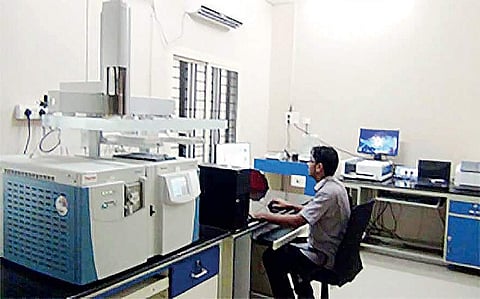

KANHANGAD: THE three hi-tech pesticide residue testing labs set up at Kanhangad, Thrissur and Kumarakom will start functioning within a month, according to the officers. Owing to lack of working capital and staff, the labs provided with state-of-the-art apparatus costing a staggering Rs 3 crore each had been lying idle. The Kanhangad lab housed at the College of Agriculture at Padannakkad was inaugurated by Chief Minister Pinarayi Vijayan on March 30, 2017. Though run by the Kerala Agricultural University (KAU), the labs are funded by the state government. Currently, the only Pesticide Residue Research and Analytic a l L a b o r a t o r y (PRRAL) is at the College of Agriculture, Vell a y a n i i n Thiruvananthapuram. Varsity authorities said they had sought Rs 55 lakh working capital for each of the three labs.
“An allocation of Rs 40 lakh was made in the last budget, but we got the money just now,” said a senior scientist there. He said each of the labs will recruit five persons, including three lab technicians, on contract basis and they will be headed by a university scientist. “We expect to complete the hiring process and training of the staff within one month,” he said. The staff will be offered a three-year contract. Nonetheless, the scientists said though the labs are yet to go on stream, it did not stop them from continuously checking the vegetables and fruits brought in from outside the state. “Now we collect the samples and send them to the lab at Vellayani,” said a faculty member at the Padannakkad college. He said samples are collected once every two or three weeks from the Kanhangad, Nileshwaram and Payyannur vegetable markets. “But when the lab set up at the college starts functioning, we can check the pesticide residue in the vegetables every week,” he said. Contrary to the notion regarding the reckless use of pesticides by the farmers, the scientists said the farmers did not overuse pesticides.
“The pesticide levels are well within the prescribed levels now,” the scientist said. The testing takes around one week and costs around Rs 6,000 for a sample. He, however, said even with the new lab, they will not be able to identify the new generation pesticides used on fruits and vegetables. “We will still have to send the extracts of the vegetables to the lab at Vellayani to check for new-gen pesticides,” he said. The three labs at Padannakkad, Thrissur and Kumarakom have gas chromatography-mass spectrometry (GC-MS) instrument. “The new generation pesticides are water soluble and will not show up during the test conducted using the GC-MS instrument,” he said. The scientists said they had submitted a proposal for procuring equipment capable of detecting the new gen pesticides also. “Once the equipment becomes available, we will shift to the new block built to house the pesticide residue testing lab on the college campus at Padannakkad we will be on a par with the Vellayani lab,” a scientist said.
Rs 55 L Working capital sought for each of the lab
Rs 6,000 Cost per sample for testing pesticide levels